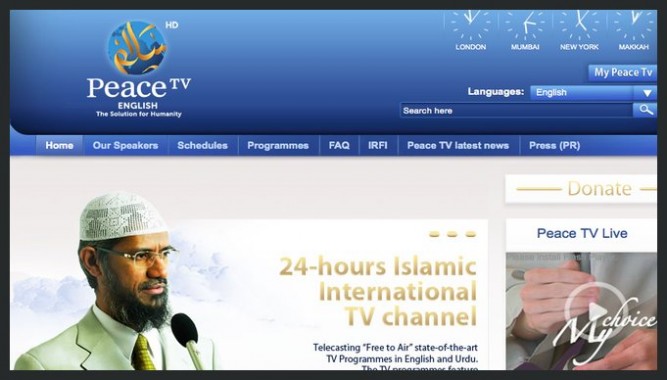Decoding the dreaded Peace TV
How rabid is Peace TV? The question merits asking after a flurry of reports about countries that have banned the channel or denied it downlinking permission. The new minister for information and broadcasting Venkiah Naidu says it is affecting peace. Websites are scooting around trying to track down the production house in Mumbai that produces a lot of its programmes in an effort to prove something, anything.
But this newly notorious channel is a bit of an anti-climax when you watch it online. There is an international channel in English and an Urdu one. Both have such a heavy dose of pedantic religious teaching delivered by older men sitting in chairs, that they are far from mesmerising.
Much of this recent paranoia (and the good minister’s statement) derives from the linking of the man behind the channel, Indian preacher Zakir Naik, with the Bangladesh terror attack. It depends how you define linkage. The Daily Star of Bangladesh which started off this accusation did it on the basis of information that one of the killers posting something about this preacher urging Muslims to be terrorists on his Facebook account last year.
The Star has since half backtracked but of course in India the alleged association has acquired a life of its own. Not only did Times Now and Zee TV live off it, the Indian Express reported it casually as if it was a fact, putting this line in the intro of its Venkiah Naidu story: “who is said to have inspired some of those involved in the recent Dhaka terror attacks.” By the time IANS got to putting it out one killer “inspired” by Naik had become two.
Naik was quick to react in a video that he posted on his Twitter account asking whether the Indian media feels the need to check out facts. It does not, and he and Peace TV being royally demonized is par for the course.
First of all this channel seems less a messianic outlet than a family enterprise. Whatever else Zakir Naik inspires, fire and brimstone zeal that will provoke young men to go out and kill seems most unlikely. He poses for promos in a haze of red colour, with light bulbs flashing above and around him. As kitschy as preachers come. His young son has a show of his own on both channels, his daughter sings somewhat tunelessly on both.
His audiences seem absorbed but passively so. Parse his convoluted (and devious) logic and his prescriptions, and none of it seems geared to galvanise. And through the endless Islamic speeches and sermons that run through the day, delivered by people from many continents, there is more rote and recitation of verses from the Hadith than fiery rhetoric. Peace TV, at least to the casual viewer, is more about being a suffocatingly good Muslim rather than a murderous one.
There are endless sermons on the tenets of Islam. And, about persuading the rest of the world to become Muslims as well. A young woman at one of his talk venues asks how can she get a Hindu ‘sister’ to ‘revert’ to Islam? “So how do I convince her?”
Naik tells her she must tell the Hindu sister to submit her will to almighty God. “In Arabic a person who submits to God is a Muslim” he says with a smile.
He adds that there are similarities between Hinduism and Islam that he has talked about. “Give that tape to her.” To another who asks the question why Christians believe in the spirit and the holy ghost, he says “because it is mentioned in the Bible…unfortunately Christians also believe in trinity. Holy spirit is no problem. The word trinity is not there in the Bible. The Koran says don’t say trinity. It is blasphemy to say God is three in one.”
Naik’s worldview apart, the views expressed on Peace TV are far from liberal. Same sex relationships are not approved of, sending Muslim children to Christian schools is not approved of. Christianity comes in for a variety of interpretations based on facts that could be dubious. May be that helped to make him unpopular with the new British PM Theresa May when she was home secretary and had his visa revoked. As PM however, she will have to deal with a preacher whose English channel is squarely aimed at a UK audience, elaborately soliciting contributions from it, giving programme timings in UK time.
Where does the appeal to youth that this channel is supposed to have come from? At its worst, it resembles Doordarshan. Boring and pious conversations, flower vases and potted plants.
There are lots of young people listening in the audiences shown on TV, and much programme time is filled by young children acting out and chanting Islamic tenets. Is this the kind of indoctrination that radicalizes youth? It seems a bit of a stretch. But his reputation for having said that non believers must be killed is evidently in the minds of some of his youthful listeners. They ask him about this. He says it has been taken out of context, and lambasts Arun Shourie’s writings.
Mr Naidu reportedly said this week, “in recent days, the so-called Peace TV is affecting the peace. Some countries also banned that channel. Here, the question of a ban doesn’t arise because it is not permitted at all. They applied for permission in 2008 and appealed in 2009 and were rejected for security reasons… Do not allow any such thing to be telecast that will vitiate the atmosphere of society.”
Spending a few hours watching Peace TV’s claustrophobic prescriptions for being a good Muslim is not long enough to gauge whether that qualifies as vitiating the atmosphere of society. But nor is there enough official evidence on offer to substantiate the charge.







